March 11. William Carey. Carey grew up poor, with a meager education. But after he was converted, his thirst for education was so great that he mastered Latin grammar in six weeks, French and Dutch in three weeks each, and quickly learned Greek and Hebrew. Eventually, Carey earned the title of Doctor and became a professor at the first British college in Calcutta.
Carey longed to take the gospel where people had never heard of Jesus. Education was simply a means to that end.
Carey turned over his ability with languages to God and became known as “the father of modern missions.” In spite of opposition at home (from churches in England and from his own wife), Carey organized a missionary society and went to India.
During the voyage from England to India, he translated the book of Genesis into the language of Bengal. During his time in India, Carey and his co-workers established the Serampore Missionary Press and translated the New Testament into twenty-three languages.
On this date in 1812, a fire blazed through that printing press. But that’s not the end of this story.
If God has a job for you to do, no power on earth can stop you.
Carey once asked John Newton what would happen if—when he finally got to Bengal—the East India Company just sent him home.
“Then conclude,” Newton said, “that your Lord has nothing there for you to accomplish. But if He have, no power on earth can hinder you.”
In 1798, Carey ordered a wooden printing press from Calcutta and had it shipped to their site in a tiger-infested and very wet region. Thus, the Serampore Missionary Press was born, and Carey got so happy and excited, some of the natives thought the press must be some kind of English deity.
More presses were added. Over the next twelve years, Carey translated the Bible into Bengali and Sanskrit and other major languages and dialects—many of which had never been printed before. And he started a school and taught boys to read the Bible.
Then one night, a fire broke out in one of the offices. Despite valiant efforts to fight it, the building burned fiercely.
Carey’s entire library, the completed Sanskrit dictionary, a large portion of the Bengali dictionary, multiple grammar books, and 10 original translations of the Bible were lost in the fire. All but 5 pieces of equipment were destroyed, including the typesets for the 14 different Eastern languages they were printing. Of the 1200 reams of paper they had imported from England, nothing remained.
Tears streamed down Carey’s face as he spoke. “In one short evening the labors of years are consumed. How unsearchable are the ways of God!” Now was the time Carey needed to remember what John Newton had told him—if God had work for Carey to do, “no power on earth can hinder you.”
Heartbroken, Carey chose to believe, as he had so many times before, that God’s will would prevail. “For the LORD Almighty has purposed, and who can thwart him? His hand is stretched out, and who can turn it back?” (Isaiah 14:27 NIV).
He wrote to the missionary society in England. “The loss is heavy, but as traveling a road the second time is usually done with greater ease than the first time, so I trust the work will lose nothing of real value … We are cast down but not in despair. … The loss is very great, but I can think of a hundred circumstances that would make it more difficult to bear.” His thought was to examine himself to see what in himself might have added to this evil.
Within a few months, Carey had rebuilt the press and set up a new base of operations in a warehouse.
What he didn’t know was that the print-shop fire would bring him and the missionary cause in India to the attention of people all over Europe and America. Over the ensuing months, over 10,000 British pounds were collected for rebuilding the missionary press in Serampore—from England and Scotland alone!
As Carey’s fame grew, volunteers poured into India. Twenty years later, the expanded printing operation had published complete Bibles or portions of the Bible in forty-four local languages and dialects.
Can you think of a time a setback fulfilled God’s will in your life? If God has a job for you, no power on Earth can stop you.
Pounds, Jessie Brown. “Pioneer Missionaries: William Carey.” Missionary Biographies. Wholesome Words. Accessed August 21, 2020. https://www.wholesomewords.org/missions/bcarey11.html.
Benge, Janet and Geoff. William Carey: Obliged to Go. Seattle: YWAM Publishing, 1998.
Galli, Mark. “William Carey—The Man Who Wouldn’t Give Up” Christianity Today International/Christian History magazine. Published 1992. https://www.hopefaithprayer.com/online-books/william-carey-the-man-who-wouldnt-give-up/.
Galli, Mark, “William Carey: The Christian History Timeline” Christianity Today International/Christian History magazine. Issue 36. Published 1992. https://christianhistoryinstitute.org/magazine/article/william-carey-timeline.
Smith, George, “The Life of William Carey: Shoemaker & Missionary” The Reformed Reader. Published 1999. http://www.reformedreader.org/rbb/carey/lifeofwilliamcarey/wcareych10.htm.
Story read by Chuck Stecker
Would You Like to Learn More About This Man?
William Carey founded the Serampore College and the Serampore University, the first degree-awarding university in India.
Dr. Carey once said to his nephew, whose design he seems to have suspected, “Eustace, if after my removal any one should think it worth his while to write my Life, I will give you a criterion by which you may judge of its correctness. If he give me credit for being a plodder he will describe me justly. Anything beyond this will be too much. I can plod. I can persevere in any definite pursuit. To this I owe everything.”

Where Carey Lived at Serampore College
Grant, Colesworthy Portrait sketch. Accessed October 12, 2020. https://en.wikipedia.org/wiki/William_Carey_(missionary)





